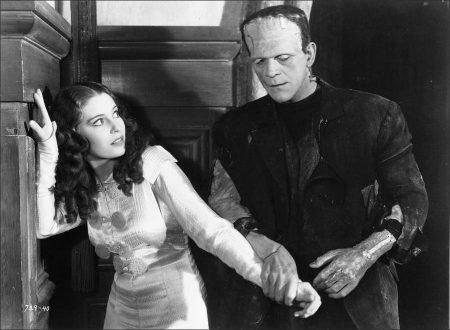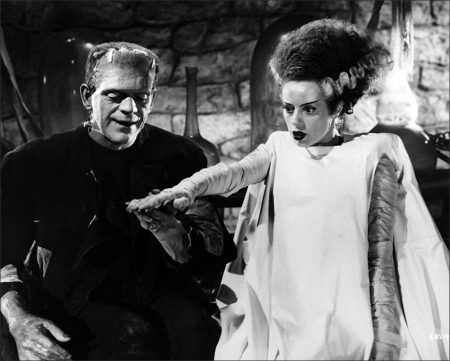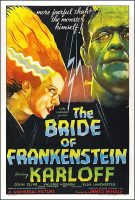Tagline: …more fearful than the monster himself!
The Bride of Frankenstein movie storyline. On a stormy night, Percy Bysshe Shelley (Douglas Walton) and Lord Byron (Gavin Gordon) praise Mary Shelley (Elsa Lanchester) for her story of Frankenstein and his Monster. Reminding them that her intention was to impart a moral lesson, Mary says she has more of the story to tell. The scene shifts to the end of the 1931 Frankenstein.
Villagers gathered around the burning windmill cheer the apparent death of the Monster (Boris Karloff). Their joy is tempered by the realization that Henry Frankenstein (Colin Clive) is also apparently dead. Hans (Reginald Barlow), father of the girl the creature drowned in the previous film, wants to see the Monster’s bones. He falls into a flooded pit underneath the mill, where the Monster – having survived the fire – strangles him. Hauling himself from the pit, the Monster casts Hans’ wife (Mary Gordon) to her death. He next encounters Minnie (Una O’Connor), who flees in terror.
Henry’s body is returned to his fiancée Elizabeth (Valerie Hobson) at his ancestral castle home. Minnie arrives to sound the alarm about the Monster, but her warning goes unheeded. Elizabeth, seeing Henry move, realizes he is still alive. Nursed back to health by Elizabeth, Henry has renounced his creation, but still believes he may be destined to unlock the secret of life and immortality.
A hysterical Elizabeth cries that she sees death coming, foreshadowing the arrival of Henry’s former mentor, Doctor Septimus Pretorius (Ernest Thesiger). In his rooms, Pretorius shows Henry several homunculi he has created, including a miniature queen, king, archbishop, devil, ballerina, and mermaid. Pretorius wishes to work with Henry to create a mate for the Monster and offers a toast to their venture: “To a new world of gods and monsters!” Upon forcing Henry to help him, Pretorius will grow an artificial brain while Henry gathers the parts for the mate.
The Monster saves a young shepherdess (Anne Darling) from drowning. Her screams upon seeing him alert two hunters, who shoot and injure the creature. The hunters raise a mob that sets out in pursuit. Captured and trussed to a pole, the Monster is hauled to a dungeon and chained. Left alone, he breaks his chains, kills the guards and escapes into the woods.
That night, the Monster encounters a gypsy family and burns his hand in their campfire. Following the sound of a violin playing “Ave Maria”, the Monster encounters an old blind hermit (O. P. Heggie) who thanks God for sending him a friend. He teaches the monster words like “friend” and “good” and shares a meal with him. Two lost hunters stumble upon the cottage and recognize the Monster. He attacks them and accidentally burns down the cottage as the hunters lead the hermit away.
Taking refuge from another angry mob in a crypt, the Monster spies Pretorius and his cronies Karl (Dwight Frye) and Ludwig (Ted Billings) breaking open a grave. The henchmen depart as Pretorius stays to enjoy a light supper. The Monster approaches Pretorius, and learns that Pretorius plans to create a mate for him.
The Bride of Frankenstein (1935), a masterpiece of classic horror films of the 1930s, appears as a series than the original prototype of Frankenstein (1931). [There are so few sequels that are superior to their predecessors – Another example would be The Godfather, Part II (1974).] Although the film was in production, it was titled The Return of Frankenstein until that it is released. The film’s title is actually a misnomer – the bride “is not the Frankenstein monster’s bride, but Elizabeth (played by seventeen years Valerie Hobson), wife of Dr. Frankenstein. [Mention of the film often falls on the “The” title of the film.]
The macabre, satirical film is generally regarded as one of the greatest horror movies of all time – a spectacular, bizarre, high-camp, too, humor, slapstick and surreal film. Both films were produced by Carl Laemmle Jr. Frankenstein (the head of Universal) and directed by horror master James Whale, at a time when monster movies were diminishing. The film reunites Colin Clive (as Dr. Frankenstein) with Boris Karloff as the monster, but has introduced two new characters in the foreground: Ernest Thesiger as a necromancer who has miniaturized and detained several people in glass jars, and Elsa Lanchester the Monster Bride.
Whale provided all parodies of horror with its current and future workforce, insurmountable swansong on-the-top in the genre. The next two films in the series have been second sequel to Universal’s original 1931 film – Director Rowland V. Lee ‘s Son of Frankenstein (1939), with the third and final appearance as the Karloff monster in a feature film. It was followed by the all-star House of Frankenstein (1944), with Boris Karloff in the role of evil scientist Dr. Niemann.
The Bride of Frankenstein (1935)
Directed by: James Whale
Starring: Boris Karloff, Elsa Lanchester, Valerie Hobson, Colin Clive, Ernest Thesiger, Gavin Gordon, Douglas Walton, Una O’Connor, Lucien Prival, Reginald Barlow, Mary Gordon, Anne Darling
Screenplay by: William Hurlbut
Cinematography by: John J. Mescall
Film Editing by: Ted J. Kent
Costume Design by: Vera West
Art Direction by: Charles D. Hall
Music by: Franz Waxman
Distributed by: Universal Pictures
Release Date: April 20, 1935
Views: 204


